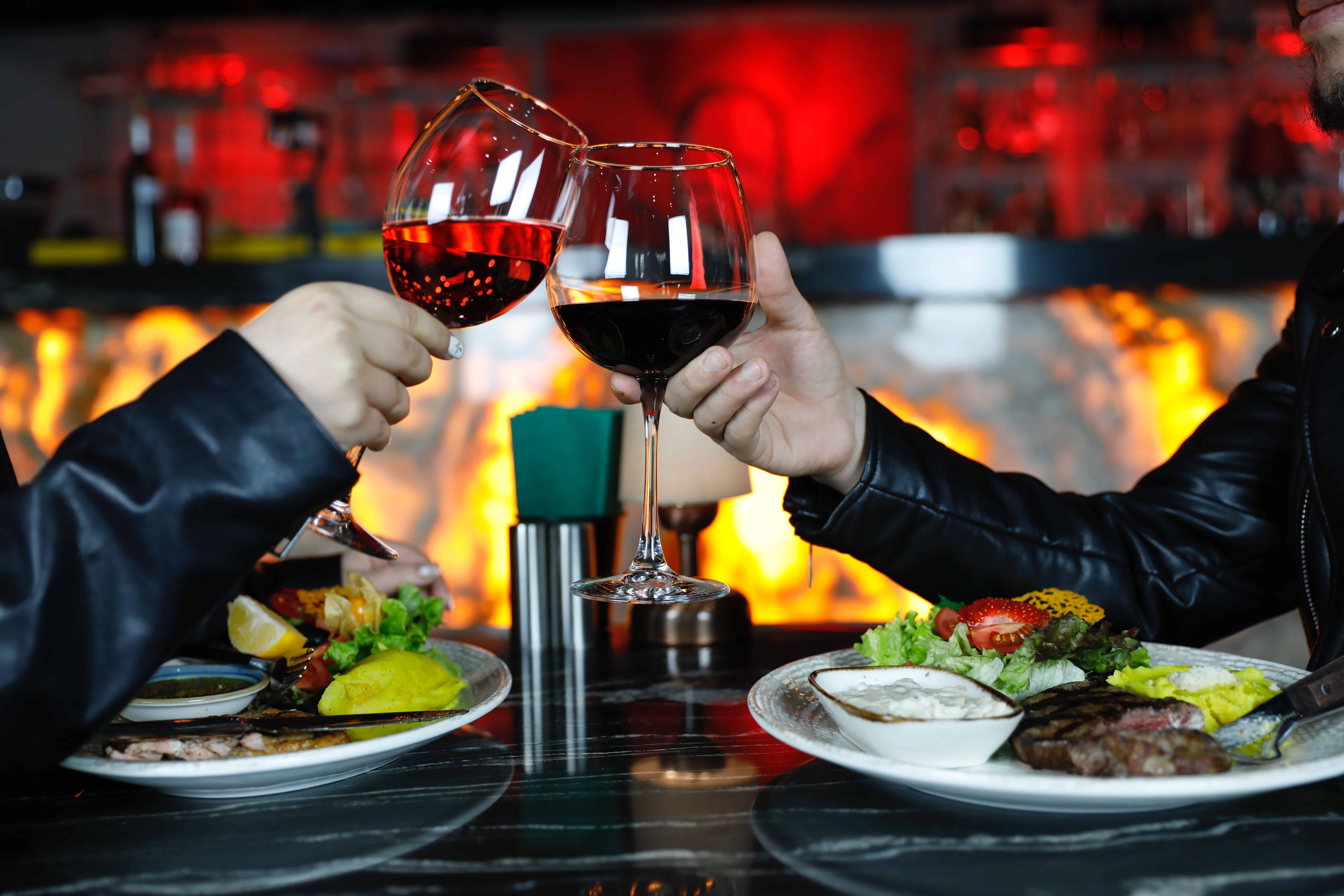
Cheers in French: 10 Ways to Make a Toast
Some time ago, I found myself sitting in the kitchen with my French friend Julie, begging for her help after being invited to make a toast at my friend’s wedding in French.
Julie happily told me all about French toasting culture, from a little history to warning me about a couple of potential faux pas to avoid.
Today I’m going to share what she told me! In this article I share 10 ways to say “cheers” in French, and also give some insight into the French toasting traditions.
So pull up a chair, pour yourself a glass and get practicing!
Contents
- How to Say “Cheers” in French
- 1. Santé (Health)
- 2. À ta santé / À votre santé (To your health)
- 3. À la nôtre / À la vôtre / À la tienne (To yours)
- 4. Portons un toast (Let’s make a toast)
- 5. Levons nos verres à… (Let’s raise our glass to…)
- 6. Je lève mon verre à… (I raise my glass to…)
- 7. On trinque ? (Shall we toast?)
- 8. Trinquer à… (To drink to…)
- 9. Tchin-tchin (Chin-chin)
- 10. Cul sec (Bottoms up)
- Useful Vocabulary for Making Toasts
- French Toasting Traditions and Superstitions
- The History of Toasting in France
- And one more thing...
Download: This blog post is available as a convenient and portable PDF that you can take anywhere. Click here to get a copy. (Download)
How to Say “Cheers” in French
1. Santé (Health)
Use: Both formal and informal
While there is a longer variation of this phrase (which we’ll see below), it’s very common to just use santé (health) all by itself as a toast.
It’s a safe option for both formal and informal contexts.
2. À ta santé / À votre santé (To your health)
Use: Formal
À votre santé (“to your health,” plural/formal) is used commonly as a generic toast.
If you’re only drinking with one other person and it’s someone you know well, you’d probably use the singular informal version, À ta santé.
3. À la nôtre / À la vôtre / À la tienne (To yours)
Use: Informal
There’s another twist to the popular à votre santé toasting formula: informal French toasts often drop the word santé (health) and just use à la nôtre (to ours) or à la vôtre (to yours). In this context, the word health is just assumed.
If you’re toasting a good friend one-on-one, you’d say, À la tienne (to your [health], singular informal).
4. Portons un toast (Let’s make a toast)
Use: Formal
If you’re at a formal occasion, such as a wedding or a dinner party, you might want to drink a toast to your hosts or to the guests of honor.
The proper French term for making a toast (albeit with a loan from English) is porter un toast. If you’d like your fellow guests to drink with you, you can say, Portons un toast (Let’s make a toast).
5. Levons nos verres à… (Let’s raise our glass to…)
Use: Informal
An alternative to porter un toast is lever nos verres (to raise our glasses).
You might lift your wine glass and suggest, Levons nos verres aux mariés (Let’s raise our glasses to the newlyweds).
6. Je lève mon verre à… (I raise my glass to…)
Use: Informal
Maybe you want to be a little less demanding in your suggestion for a toast, so you choose to start the trend with your own example.
If you’re at a formal gathering for le Quatorze juillet (July 14th, or Bastille Day), you might say, Je lève mon verre à la liberté (I raise my glass to freedom).
7. On trinque ? (Shall we toast?)
Use: Informal
If you’re feeling festive while at a bar with your buddies, you can say, On trinque ? (Shall we toast?).
Trinquer also means to make the glasses clink together.
8. Trinquer à… (To drink to…)
Use: Informal
If you want to propose an informal toast, you can use the formulation (to drink to/toast someone or something).
For example:
Je trinque à ma sœur et mon beau-frère. (I drink to my sister and my brother-in-law.)
Trinquons à votre nouvelle maison. (Let’s drink to your new house.)
Someone who enjoys toasting and drinking in the company of others can be called un trinqueur (masculine) or une trinqueuse (feminine).
9. Tchin-tchin (Chin-chin)
Use: Informal
Another popular toast used among friends is tchin-tchin. It’s pronounced like “chin-chin” would be in English.
Brought back from the Second Opium War by returning French soldiers, tchin-tchin comes from the Chinese phrase qǐng qǐng, which is the word “please” said twice in a row.
In this context, it’s used to encourage someone to have a drink.
10. Cul sec (Bottoms up)
Use: Informal
If you’re toasting with hard liquor, you may hear the expression cul sec (dry bottom).
Used like “Bottoms up,” cul sec exhorts you to drink ‘til the glass is empty—in a single shot, if possible.
As you can see, there are many different ways to say “cheers” in French, all depending on the context and formality of the situation you may find yourself in.
One of the best ways to learn how and when to use these expressions is by consuming French media such as French movies or TV shows to see how the language is actually used in context by native speakers.
By immersing yourself in native French content, you’ll be able to pick up these phrases and start adding them to your own vocabulary.
FluentU takes authentic videos—like music videos, movie trailers, news and inspiring talks—and turns them into personalized language learning lessons.
You can try FluentU for free for 2 weeks. Check out the website or download the iOS app or Android app.
P.S. Click here to take advantage of our current sale! (Expires at the end of this month.)
Useful Vocabulary for Making Toasts
Now that you have a few sayings to keep on standby, it’s also good to have some of the basic terms and phrases ready for whenever a moment to toast appears. (And if you are new to French toasting culture, here is a video on how to hold your glass, straight from the source).
Try practicing these phrases and holding your glass.
- Toutes nos félicitations – Congratulations
- Joyeux anniversaire ! – Happy birthday!
- Félicitations à l’heureux couple ! – Congratulations to the happy couple!
- Bonne chance ! – Good luck!
- À ta nouvelle aventure – To your new adventure
- À de nouveaux départs – To new beginnings
- À vos fiançailles – To your engagement
- Bonne retraite ! – Happy retirement!
- Bonne année ! – Happy New Year!
- Félicitations pour la naissance de votre bébé ! – Congratulations on the birth of your baby!
- Bravo pour tes études – Well done on your studies
- Tu l’as fait – You did it
- Je suis si fier de toi – I am so proud of you
- Nous vous souhaitons le meilleur ! – We wish you all the best!
- Bienvenue dans l’équipe – Welcome to the team
French Toasting Traditions and Superstitions
You might know some different ways to say “cheers” now, but it’s not just about the words you say.
Here are some other French courtesies and habits that you should know to make sure you’re raising your glass properly.
Look Before You Sip
Once someone has called for a toast, there are rules to be observed.
Take a look around and make sure everyone’s glass is full before you lift yours for the toast. Then, raise your glass a few inches in front of your face and wait patiently for the spoken part of the toast to be completed.
Clink Glasses With Everyone
Once the spoken part of the toast has been made, there’s still another propriety to be observed: make sure you clink glasses and exchange words with everyone in the group.
Finally, take a sip before setting your glass down.
How the French Fill (and Empty) the Glass
The contents of the toasting glasses are nearly as important as the toasting words and rituals.
The first rule is to not toast with water, juice or anything else non-alcoholic. The glass should also only be filled about half-way.
Lastly, don’t hesitate to drink the bottom dry.
Toasting Taboos
- Acknowledge or include the whole group when delivering a toast, so nobody’s left out.
- Don’t add ice cubes to the wine in toasting glasses. It won’t win you any friends if you’re hosting.
- If you don’t make eye contact while clinking glasses, bad luck will supposedly follow.
- You also don’t want to cross arms while you’re reaching to clink glasses (probably to avoid jostling glasses and spilling wine!)
- Saying salut when toasting is incorrect—salut means “hello,” not “health.” It’s possible that the confusion comes from the common use of salud (health) as a toast in Spanish-speaking countries, and salute (health) as a toast in Italy.
- Whatever you do, never ever toast with an empty glass!
The History of Toasting in France
While there are many theories of how toasting came to be—ranging from traditional Roman customs to defending oneself against poisoned drinks—the exact origin and history of toasting in France is unknown.
The most likely explanation is that toasting originated in the times of the Romans. The Roman Empire covered vast amounts of land across Europe, the Middle East and some areas of North Africa. As it expanded across Europe, the Roman Empire took with it both its language and customs.
One of the many traditions of the Romans was to toast good health to their emperor. As toasting has been a widespread tradition across Europe for centuries, this could be believed to be the origin of toasting in France and the rest of Europe.
Although the exact origin may be unclear, France has a strong history of toasting drinks, particularly over the past few centuries.
Life is full of good times and special occasions. Enjoy raising your glass and toasting to them à la manière française (in the French way).
À votre bonne santé, cher lecteur! (To your good health, dear reader!)
Download: This blog post is available as a convenient and portable PDF that you can take anywhere. Click here to get a copy. (Download)
And one more thing...
If you like learning French on your own time and from the comfort of your smart device, then I'd be remiss to not tell you about FluentU.
FluentU has a wide variety of great content, like interviews, documentary excerpts and web series, as you can see here:

FluentU brings native French videos with reach. With interactive captions, you can tap on any word to see an image, definition and useful examples.

For example, if you tap on the word "crois," you'll see this:

Practice and reinforce all the vocabulary you've learned in a given video with learn mode. Swipe left or right to see more examples for the word you’re learning, and play the mini-games found in our dynamic flashcards, like "fill in the blank."

All throughout, FluentU tracks the vocabulary that you’re learning and uses this information to give you a totally personalized experience. It gives you extra practice with difficult words—and reminds you when it’s time to review what you’ve learned.
Start using the FluentU website on your computer or tablet or, better yet, download the FluentU app from the iTunes or Google Play store. Click here to take advantage of our current sale! (Expires at the end of this month.)







